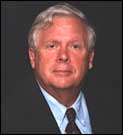Robert D. Tollison on James M. Buchanan
 I previously listed and commented on several published memorials of James M. Buchanan. Many academic journals have since published special issues on Buchanan as well as customary memorial essays. I wanted to update my earlier posts by conveying some more of Bob Tollison’s memorial in the Southern Economic Journal.
I previously listed and commented on several published memorials of James M. Buchanan. Many academic journals have since published special issues on Buchanan as well as customary memorial essays. I wanted to update my earlier posts by conveying some more of Bob Tollison’s memorial in the Southern Economic Journal.
Bob was my professor and dissertation advisor at George Mason from 94 to 97. Jim Buchanan was also on the faculty of course, and while I got to interact with him extensively in seminars and on my dissertation, I regret never having sat in his classroom. I stayed in regular touch with Bob, and occasionally chatted with Jim. I got to know Jim better in 2012 when we visited regularly about the Public Choice Society. So it was with close-up interest that I read this memorial by my professor about his professor. Here are a few lines from the opening:
Jim was a colleauge on the same faculty with me for 17-18 years. These years featured low and high points. An example of the former was a bitter departmental struggle at Virginia Tech, which ended with the move of the Center [for the Study of Public Choice] to George Mason. The high point, of course, would be the day in 1986 when Jim won the Nobel Prize, fittingly the last Nobel to be tax-free. I told Jim more than once that serving as his colleague held an honor that I place before all others (not that there are so many that have come my way). As someone once said, he was an entire university in and of himself.*
And here is the closing of it:
His great mind is now still, but he lives on in the ideas he passed on to his students, colleagues, and friends. It has been said that only poets and songwriters are immortal, but as an economist, Jim’s work surely approaches immortality because it will continue to be read and discussed throughout time to come. We still read Adam Smith (at least some of us), and it is a good bet that over 200 years from now, young scholars will pore over Jim’s articles and books in search of ideas, insights, and inspiration. This may not be an eternity, but it is a very long half-life. Better yet, maybe some future political generation will see fit to put our fiscal house in order and in doing so pay homage to our memory of Jim Buchanan. Rest in peace.
*– Robert D. Tollison, “James M. Buchanan In Memoriam” Southern Economic Journal, July 2013.
